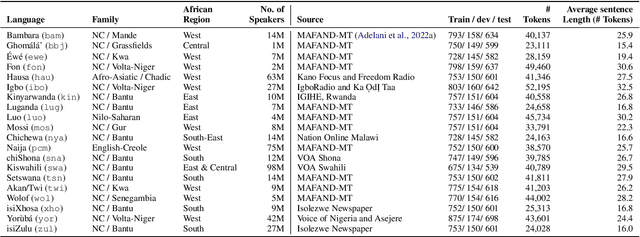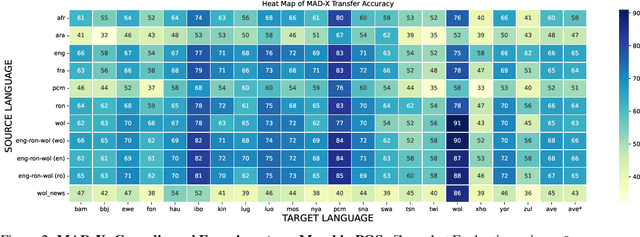Chinedu Uchechukwu
MasakhaPOS: Part-of-Speech Tagging for Typologically Diverse African Languages
May 23, 2023



Abstract:In this paper, we present MasakhaPOS, the largest part-of-speech (POS) dataset for 20 typologically diverse African languages. We discuss the challenges in annotating POS for these languages using the UD (universal dependencies) guidelines. We conducted extensive POS baseline experiments using conditional random field and several multilingual pre-trained language models. We applied various cross-lingual transfer models trained with data available in UD. Evaluating on the MasakhaPOS dataset, we show that choosing the best transfer language(s) in both single-source and multi-source setups greatly improves the POS tagging performance of the target languages, in particular when combined with cross-lingual parameter-efficient fine-tuning methods. Crucially, transferring knowledge from a language that matches the language family and morphosyntactic properties seems more effective for POS tagging in unseen languages.
Igbo-English Machine Translation: An Evaluation Benchmark
Apr 01, 2020


Abstract:Although researchers and practitioners are pushing the boundaries and enhancing the capacities of NLP tools and methods, works on African languages are lagging. A lot of focus on well resourced languages such as English, Japanese, German, French, Russian, Mandarin Chinese etc. Over 97% of the world's 7000 languages, including African languages, are low resourced for NLP i.e. they have little or no data, tools, and techniques for NLP research. For instance, only 5 out of 2965, 0.19% authors of full text papers in the ACL Anthology extracted from the 5 major conferences in 2018 ACL, NAACL, EMNLP, COLING and CoNLL, are affiliated to African institutions. In this work, we discuss our effort toward building a standard machine translation benchmark dataset for Igbo, one of the 3 major Nigerian languages. Igbo is spoken by more than 50 million people globally with over 50% of the speakers are in southeastern Nigeria. Igbo is low resourced although there have been some efforts toward developing IgboNLP such as part of speech tagging and diacritic restoration
 Add to Chrome
Add to Chrome Add to Firefox
Add to Firefox Add to Edge
Add to Edge